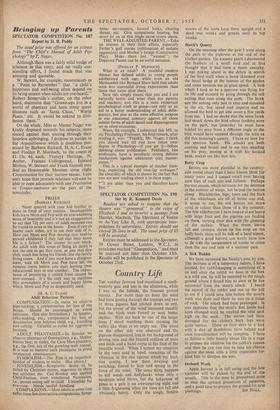Bringing up Parents
The usual prize was offered for an extract from "The Child's Manual of Adult Psy- chology" by T. Nager.
Although there was a fairly solid wedge of triteness in this entry, and no really out- standing effort, I found much that was amusing and quotable.
W. Stewart, for example, recommends as a "Point to Remember" that "a child's happiness and well-being often depend on its being unseen when adults are overheard." Robert Somerville's author, on the other hand, maintains that "Grown-ups live in a world of phantasy and have many queer illusions such as 'Santa Claus,' `World Peace,' etc. It would be unkind to disil- lusion them."
On the whole, Miss or Master Nager was kindly disposed towards his subjects, more sinned against than sinning through their hopeless upbringing. I propose to pander to the Acquisitiveness which is doubtless pos- sessed by Barbara Rickard, H. A. C. Evans and Findlay P. Murdoch, to the extent of £1 13s. 4d. each. Francys Heritage, N. Archer, Frances Collingwood, Edward Blishen, W. Stewart and Frank Dunnill may find an Honourable Mention some slight Compensation for their narrow misses. I can only hope that juvenile relations will now be able to cope adequately with any Frustration or Temper-tantrums on • the part of the remainder.
PRIZES
(BARBARA RICKARD)
. . . Never quarrel with your kid brother or sister in front of your parents. Incompatible kids leave Mom and Pop with an overwhelming sense of insecurity and it's not an exaggeration to say that 721 per cent. of adult neuroses can be traced to rows in the home. Even if you do loathe each other, try to see their side of it. How can Mom and Pop develop into healthy second childhood if they feel that their home life is a failure? The answer is—not much. An adult with this sense of being let down is not the one to get that raise, or join that new club, much less bring his friends into the family living room. And if you must have a disagree- ment, wait till Mom and Pop have left the rumpus room before you start hurling your educational toys at one another. The impor- tance of presenting a united front cannot be over-stressed. It's the only way to maintain that, atmosphere of a secure and happy home which Mom and Pop so desperately need.
(H. A. C. EVANS) Adult Behaviour Patterns
COMPENSATION.—In males we observe pipe-sucking, a compensation for loss of the breast. Should be encouraged to avoid tantrums. (See also Symbolism.) In females, cake-making, etc., compensates for loss of domination over helpless child, e.g., kneading and rolling. Valuable as outlet for aggressive instincts. ADULT PHANTASIES.—In females we observe phantasy of Omniscience, e.g., Mother knows best; in males, the Cave Man phantasy, \ e.g., the Den, lair of the growling male animal. It is wise to humour such phantasies to avoid Unpleasant consequences.
SYMBOLISM.—The Pipe is an important symbol of wisdom in.males. (See above.)
JUVENILISM.—Symptoms; desire to be called by Christian names, eagerness to share our activities, etc. Can develop into morbid Child-fixation, even transferred Narcissism, i.e., parent seeing self in child. Unhealthy for everyone. Needs tactful handling.
COMPULSIONS.—Most adults at some time suffer from Sex-Instruction compulsions. SymPs
toms: nervousness, hunted looks, clearing throat, etc. Give sympathetic hearing, but never let on as this might cause severe shock.
THE WELL-ADJUSTED PARENT.—Take an interest in their little affairs, especially Father's golf stories (sublimation of sadistic aggression) and Mother's bridge (Constructive Play). Make them feel "wanted"; the Deprived Parent can be an awful nuisance.
(FINDLAY P. MURDOCH) What is an adult? A youthful modern thinker has defined adults as young people adulterated with age; while even an old Methuselah like Bernard Shaw held that adults were less successful living experiments than those that came after them.
Now this simply means that you and I are naturally better and wiser than our parents and teachers; and this is a most important psychological truth to grasp—not only as an aid to a better understanding of adult delin- quency, but also as the most effective weapon in our emotional armoury against all those subtler forms of adult deceit and disparagement we so often encounter.
When, for example. I submitted this MS. to my Psychology Professor, his final remark, after reading it, was: "Frankly, Mr. Nager, I think you should wait till you have taken your degree in Psychology—if you get it—before thinking about publication. Publishers, like professors, have a peculiarly strong defence mechanism against adolescent (sic) master- pieces."
This is a typical example of teacher hum- bug, exploiting the old time-lag technique,* the absurdity of which is shown by the fact that you are now reading about it in these pages ...
*"I am older than you and therefore know best."


















































 Previous page
Previous page